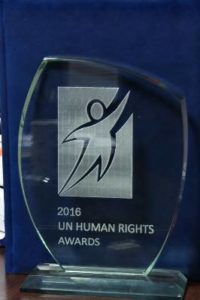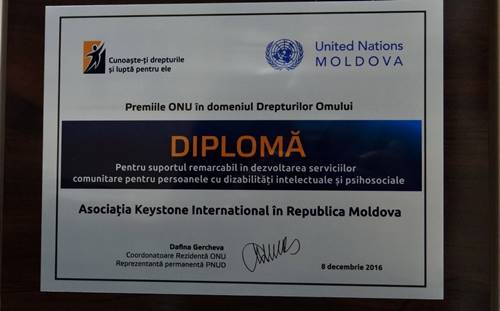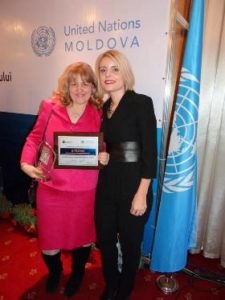 “We have worked 12 years toward this award, together with our partners – local public administrations from 12 regions of Moldova. This award represents all the successes we have achieved together – parents of children with disability, children, school teachers, local public administrations, Keystone Moldova team and donor organizations that supported our work toward social inclusion of persons with disabilities. I think this award it’s a commitment for us – to continue the reform in the field of transformation of residential institutions and social inclusion of persons with disabilities, to provide a life in the community for all” – mentioned Ludmila Malcoci, Executive director of Keystone Moldova, within UN Human Rights Award festivity.
“We have worked 12 years toward this award, together with our partners – local public administrations from 12 regions of Moldova. This award represents all the successes we have achieved together – parents of children with disability, children, school teachers, local public administrations, Keystone Moldova team and donor organizations that supported our work toward social inclusion of persons with disabilities. I think this award it’s a commitment for us – to continue the reform in the field of transformation of residential institutions and social inclusion of persons with disabilities, to provide a life in the community for all” – mentioned Ludmila Malcoci, Executive director of Keystone Moldova, within UN Human Rights Award festivity.
Keystone Moldova was founded in 2004 and has a purpose to support the persons with disabilities, poor, and other vulnerable persons to live a decent life in their families and communities. Since 2008, Keystone Moldova has a commitment for implementation of Community for all Moldova Program that is focused on de-institutionalization and social inclusion of persons with mental disabilities. In this regards, Keystone Moldova, in partnership with the Ministry of Labor, Social Protection and Family, with different donors supports (Keystone human Services International US, Soros-Moldova Foundation, Open Society Foundation/Mental Health Initiatives, European Commission, IM Swedish Development Partner, EEF, UNDP etc.) contributed to provision of human rights and better life of more than 2000 persons with disabilities and their families.
The main Keystone Moldova achievements are as following:
Deinstitutionalization and social inclusion of persons with mental disabilities.
140 persons with mental disabilities are deinstitutionalized from Orhei institutions and have been supported through person centered planning for their social inclusion in their families and communities. More than 1000 persons with disabilities ( mainly children) got support in their communities through 72 community based social services developed with Keystone Moldova support to prevent the institutionalization ((including 19 mobile teams, 9 community homes, 5 supported living houses, 5 respite services, 12 district services for personal assistants,12 foster care and shared living services, 15 support services for school inclusion etc.).
2000 persons with mental disabilities from 6 psycho-neurological institutions under transformations were currently assessed (health, social and psychological) by Keystone Moldova with the purpose of identification of their needs for better social care services planning to ensure the qualitative life in their communities in the future.
Educational inclusion.
Keystone Moldova piloted the inclusive education of children with special educational needs in 30 educational institutions (15 schools and 15 kindergartens). As a result, 225 children with special needs were integrated in regular community schools and 35 children with special educational needs were integrated in regular kindergartens. These results were achieved through the development of inclusive environment in educational institutions and communities, as well as through capacity building of educators, teachers, parents and personal assistance based on needs offered to children.
Advocacy and self-advocacy.
Keystone Moldova developed an advocacy and self-advocacy movement of persons with disabilities and their families. In this regards two networks of self-advocates and advocates were created at national level. The both networks are active in promotion of rights of persons with disabilities to live in a community and to have better access to education, health, social services and labor market. The self-advocates are also involved in discussions and advocating for provision of strategies and legislation in the field of social inclusion.
This year a self-advocate from Falesti rayon participated at Clinton Global Initiative Forum (USA) with a message on behalf of women with disabilities from Moldova. The message was focused on promotion of rights of women with disabilities in Moldova and nationwide.




 “We have worked 12 years toward this award, together with our partners – local public administrations from 12 regions of Moldova. This award represents all the successes we have achieved together – parents of children with disability, children, school teachers, local public administrations, Keystone Moldova team and donor organizations that supported our work toward social inclusion of persons with disabilities. I think this award it’s a commitment for us – to continue the reform in the field of transformation of residential institutions and social inclusion of persons with disabilities, to provide a life in the community for all” – mentioned Ludmila Malcoci, Executive director of Keystone Moldova, within UN Human Rights Award festivity.
“We have worked 12 years toward this award, together with our partners – local public administrations from 12 regions of Moldova. This award represents all the successes we have achieved together – parents of children with disability, children, school teachers, local public administrations, Keystone Moldova team and donor organizations that supported our work toward social inclusion of persons with disabilities. I think this award it’s a commitment for us – to continue the reform in the field of transformation of residential institutions and social inclusion of persons with disabilities, to provide a life in the community for all” – mentioned Ludmila Malcoci, Executive director of Keystone Moldova, within UN Human Rights Award festivity.